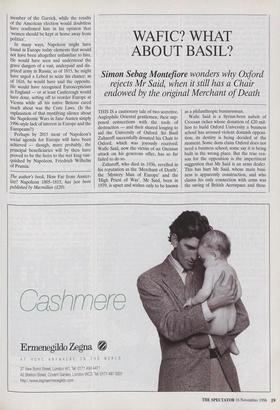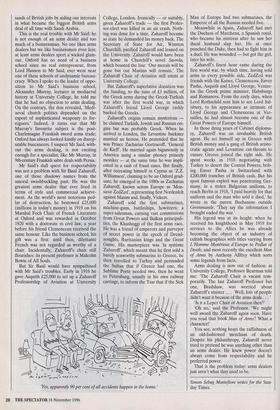WAFIC? WHAT ABOUT BASIL?
Simon Sebag Montefiore wonders why Oxford
rejects Mr Said, when it still has a Chair endowed by the original Merchant of Death
THIS IS a cautionary tale of two secretive, Anglophile Oriental gentlemen, their sup- posed connections with the tools of destruction — and their shared longing to aid the University of Oxford. Sir Basil Zaharoff successfully donated his Chair to Oxford, which was joyously received; Wafic Said, now the victim of an Oxonian attack on his generous offer, has so far failed to do so.
Zaharoff, who died in 1936, revelled in his reputation as the 'Merchant of Death', the 'Mystery Man of Europe' and the `High Priest of War'. Mr Said, born in 1939, is upset and wishes only to be known as a philanthropic businessman.
Wafic Said is a Syrian-born nabob of Croesan riches whose donation of £20 mil- lion to build Oxford University a business school has aroused violent donnish opposi- tion; its destiny is being decided at the moment. Some dons claim Oxford does not need a business school; some say it is being built in the wrong place. But the true rea- son for the opposition is the impertinent suggestion that Mr Said is an arms dealer. This has hurt Mr Said, whose main busi- ness is apparently construction, and who claims his only connection with arms was the saving of British Aerospace and thou- sands of British jobs by aiding our interests in what became the biggest British arms deal of all time with Saudi Arabia.
This is the real trouble with Mr Said: he is not enough of an arms dealer and too much of a businessman. No one likes arms dealers but we like businessmen even less; at least arms dealers sport a wicked glam- our. Oxford has no need of a business school since no real entrepreneur, from Lord Hanson to Mr Said, ever went near one of these schools of undynamic bureau- cracy. When I spoke to the leader of oppo- sition to Mr Said's business school, Alexander Murray, lecturer in mediaeval history at University College, he told me that he had no objection to arms dealing. On the contrary, the don revealed, 'Medi- aeval church politics depended on the export of sophisticated weaponry to for- eigners.' Indeed, it turns out that Mr Murray's favourite subject is the post- Charlemagne Frankish sword arms trade; Oxford has always looked kindly on disrep- utable buccaneers. I suspect Mr Said, with- out the arms dealing, is not exciting enough for a specialist, like Mr Murray, in 9th-century Frankish sabre deals with Persia.
Mr Said's dull quest for respectability was not a problem with Sir Basil Zaharoff, one of those shadowy names from the amoral swashbuckling past. He was the greatest arms dealer that ever lived in terms of style and commercial achieve- ment. As the world's most notorious ped- lar of destruction, he bestowed £25,000 (millions in today's money) in 1919 on his Marshal Foch Chair of French Literature at Oxford and was rewarded in October 1920 with a doctorate in civil law, a year before his friend Clemenceau received the same honour. Like the business school, his gift was a first: until then, dilettante French was not regarded as worthy of a chair. Incidentally, Zaharoff's chair still flourishes: its present professor is Malcolm Bowie of All Souls.
But Sir Basil would have sympathised with Mr Said's troubles. Early in 1916 he gave Asquith £25,000 to set up a Zaharoff Professorship of Aviation at University College, London. Ironically — or suitably, given Zaharoff's trade — the first Profes- sor-elect was killed in an air crash. Noth- ing was done for a time. Zaharoff became so irate he demanded his money back. The Secretary of State for Air, Winston Churchill, pacified Zaharoff and leaned on the University. Zaharoff would have been at home in Churchill's novel Savrola, which boasted the line: 'Our morals will be gone but our Maxims will remain.' The Zaharoff Chair of Aviation still exists at University College.
But Zaharoff's superlative donation was the funding, to the tune of £3 million, of the Greek army during the Greek-Turkish war after the first world war, in which Zaharoffs friend Lloyd George rashly backed the Greeks.
Zaharoff's origins remain mysterious he claimed Turkish, Jewish and Russian ori- gins but was probably Greek. When he arrived in London, the Levantine huckster married an heiress. He pretended that he was Prince Zacharias Gortzacoff, 'General de Kieft. He married again bigamously in America using a similar phoney princely moniker — at the same time he was impli- cated in a rash of fraud cases. But finally, after recreating himself in Cyprus as `Z.Z. Williamson', claiming to be an Oxford grad- uate, he emerged in the 1880s as Zacharias Zaharoff, known across Europe as 'Mon- sieur ZedZed', representing first Nordenfelt against Maxim and, finally, Vickers.
Zaharoff sold the first submarines, machine-guns, battleships, howitzers: a super-salesman, earning vast commissions from Great Powers and Balkan principali- ties, the Khashoggi of the first arms race. He was a friend of emperors and purveyor of secret power in the epoch of Dread- noughts, Ruritanian kings and the Great Game. His masterpiece was 'la systeme Zaharoff, which meant that he first sold a barely seaworthy submarine to Greece, he then travelled to Turkey and persuaded the Sultan that if Greece had one, the Sublime Porte needed two, then he went to Petersburg, usually in his own railway carriage, to inform the Tsar that if the Sick `Yes, apparently 90 per cent of all accidents happen in the home.' Man of Europe had two submarines, the Emperor of all the Russias needed five.
Meanwhile in Spain, Zaharoff had met the Duchess of Marchena, a Spanish royal, who became his mistress after he saw her ducal husband slap her. He at once punched the Duke, then had to fight him in a duel. He was wounded — but got the girl, later his wife.
Zaharoffs finest hour came during the first world war, by which time, having sold arms to every possible side, ZedZed was friends with the Kaiser, Clemenceau, Enver Pasha, Asquith and Lloyd George, Venize- los the Greek prime minister, Habsburgs and Romanovs. From the early days, when Lord Rothschild sent him to see Lord Sal- isbury, to his appearance as intimate of Lloyd George and Clemenceau at Ver- sailles, he had almost become one of the Great Powers of Europe himself.
In those dying years of Cabinet diploma- cy, Zaharoff was an invaluable British agent. He set himself up in Greece with British money and a gang of British aristo- cratic agents and Levantine cut-throats to ensure Greece joined the right side. He spent weeks in 1918 negotiating with Turkey to desert the Central Powers, brib- ing Enver Pasha in Switzerland with £200,000 tranches of British cash. But his n,iost famous exploit was penetrating Ger- many, in a stolen Bulgarian uniform, to reach Berlin in 1918, 'I paid heavily for that uniform and the man who sold it died,' he wrote in the purest Buchanese outside Greenmantle. 'They say the information I brought ended the war.'
His legend was at its height: when he received his knighthood in May 1919 for services to the Allies he was already becoming the object of an industry of cultish biographies with titles varying from L'Homme Mysterieux d'Europe to Pedlar of Death; and most recently the excellent Man of Arms by Anthony Allfrey which sorts some legends from facts.
Arms dealing is now out of fashion: at University College, Professor Bearman told me: 'The Zaharoff Chair is vacant tem- porarily. The last Zaharoff Professor but one, Bradshaw, was worried about Zaharoff's sinister . . . Well, lots of people didn't want it because of the arms deals . . . '
`Is it a Leper Chair of Aviation then?'
`Oh no,' said the Professor. 'We might well award the Zaharoff again soon. Have you read that book Man of Arms? What a character!'
You see, nothing beats the raffishness of an old-fashioned merchant of death. Despite his philanthropy, Zaharoff never tried to pretend he was anything other than an arms dealer. He knew power doesn't always come from respectability and he preferfed power.
That is the problem today: arms dealers just aren't what they used to be.
Simon Sebag Montefiore writes for the Sun- day Times.



















































































 Previous page
Previous page